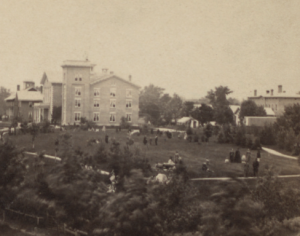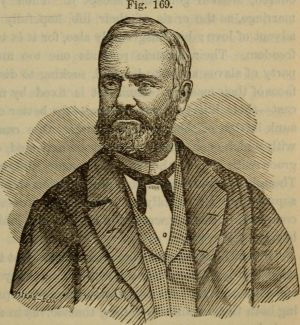One of our staff members is contributing considerably to a News Archiving service at Mu. Any well educated (Masters, PhD or above) users who wish to make comments on news sites, please contact Jim Burton directly rather than using this list, and we can work on maximising view count.
The Oneida Community

Oneida Community (1848-1880), also called Perfectionists, or Bible Communists, was a utopian religious community established by the Christian socialist John Humphrey Noyes and some of his disciples in Oneida, New York, in 1847. As new recruits arrived, the society turned into a socialized community and reached an estimated maximum population of about 300 people. Noyes is credited with coining the term "free love", and instituted what was termed "complex marriage" for those living at Oneida, where any member was free to have sex with any other who agreed, and possessiveness and exclusive relationships were frowned upon. Against monogamy, at Oneida every woman was the wife of every man, and every man was the husband of every woman. Less controversial at the time, Noyes established a system where females over the age of 40 acted as sexual mentors to adolescent males, and older males often introduced young women to sex. With partners often selected by Noyes himself, it was hoped that the more devout followers of the community would influence the attitudes of the non-devout, thus creating a system of institutionalized age-disparate sexual contact.

These forms of free love were instituted to teach "male continence", referring to the practice of delaying orgasm and ejaculating outside the body to avoid pregnancy. Or, as the title of one of Noyes's books put it, "Male continence: or, self-control in sexual intercourse." (1866).[1] In 1993, the archives of the community were made available to scholars for the first time, and contained within the archives was the journal of Tirzah Miller,[2] Noyes' niece, who wrote extensively about her romantic and sexual relations with other members of Oneida.[3]
Noyes developed a distinction between "amative" and "propagative" love:
Complex marriage meant that everyone in the community was married to everyone else. All men and women were expected to have sexual relations and did. The basis for complex marriage was the Pauline passage about there being no marriage in heaven meant that there should be no marriage on earth, but that no marriage did not mean no sex. But sex meant children ; not only could the community not afford children in the early years, the women were not enthusiastic about a regime that would have kept them pregnant most of the time. They developed a distinction between amative and propagative love. Propagative love was sex for the purpose of having children; amative love was sex for the purpose of expressing love. The difference was what Noyes called "male continence", in which the male partner avoided ejaculation. Noyes argued that this practice not only kept them from producing unwanted children but also taught the male considerable self-control. The system worked very well.[4]
During its existence under Noyes, Oneida Community lived through self-organized, self-subsistence farming, later manufacturing the Oneida silver plate to finance the community. All community members were expected to work, each according to his or her abilities. The community was organized into 48 departments that carried on the various activities of the settlement, and these activities were supervised by 21 committees. There were smaller Noyesian communities in Wallingford, Connecticut; Newark, New Jersey; Putney and Cambridge, Vermont, and these branches closed in 1854 except for the Wallingford branch, which operated until being destroyed by a tornado in 1878.
The community eventually declined due to multiple factors. These include a leadership struggle after Noyes tried to make his son, Theodore Noyes, the next leader, which divided the community, as well as mounting hostility to complex marriage in the surrounding communities, which Noyes advised the group to abandon in 1879. As the reorganization of the community began, the entire Socialist organization of property in Oneida also was questioned. Noyes and a few adherents went to live in Canada, where Noyes died in 1886. The remaining members set up a joint stock company, known as Oneida Community, Ltd. which carried on the various industries, particularly the manufacture of silver plate, as a commercial enterprise.
Noyes published several books, including: Bible Communism (1848), Male Continence (1848), Scientific Propagation (1873), and Home Talks (1875), and History of American Socialisms (1870), an investigation of utopian socialist communities in the United States.
References
- ↑ Male continence: or, self-control in sexual intercourse
- ↑ Herrick, Tirzah Miller; Fogarty, Robert S. (2000). Fogarty, Robert S. (ed.). Desire and Duty at Oneida: Tirzah Miller's Intimate Memoir. Bloomington Indianapolis: Indiana University Press.
- ↑ Chmielewski, Wendy E. (2001). "Review of Desire and Duty at Oneida: Tirzah Miller's Intimate Memoir". in Utopian Studies. 12 (1): 176-178
- ↑ Claeys, Gregory; Sargent, Lyman Tower (2017). The Utopia Reader (Second ed.). New York: New York University Press. pp. 217–219 (p. 218).